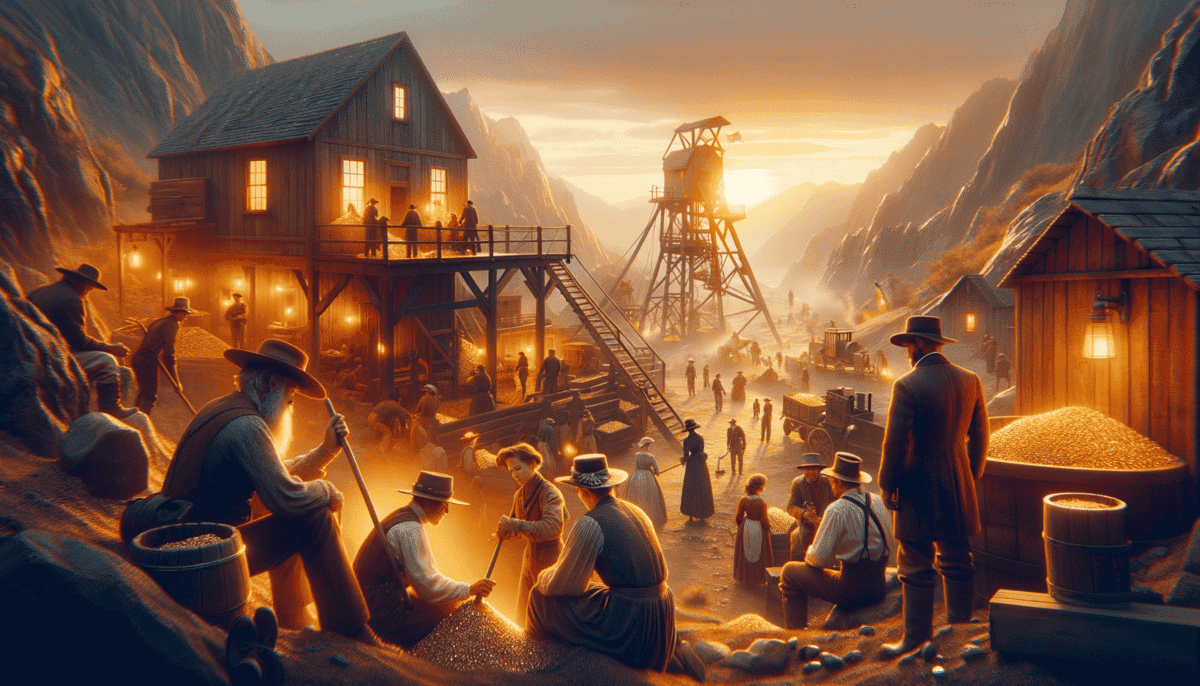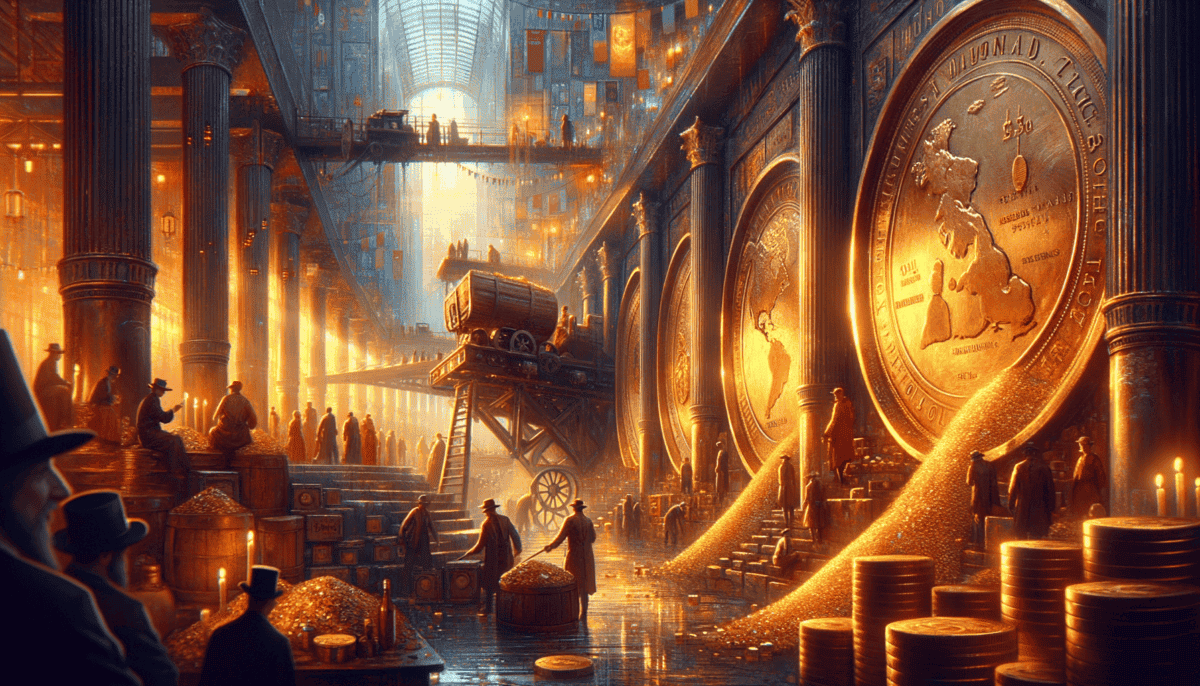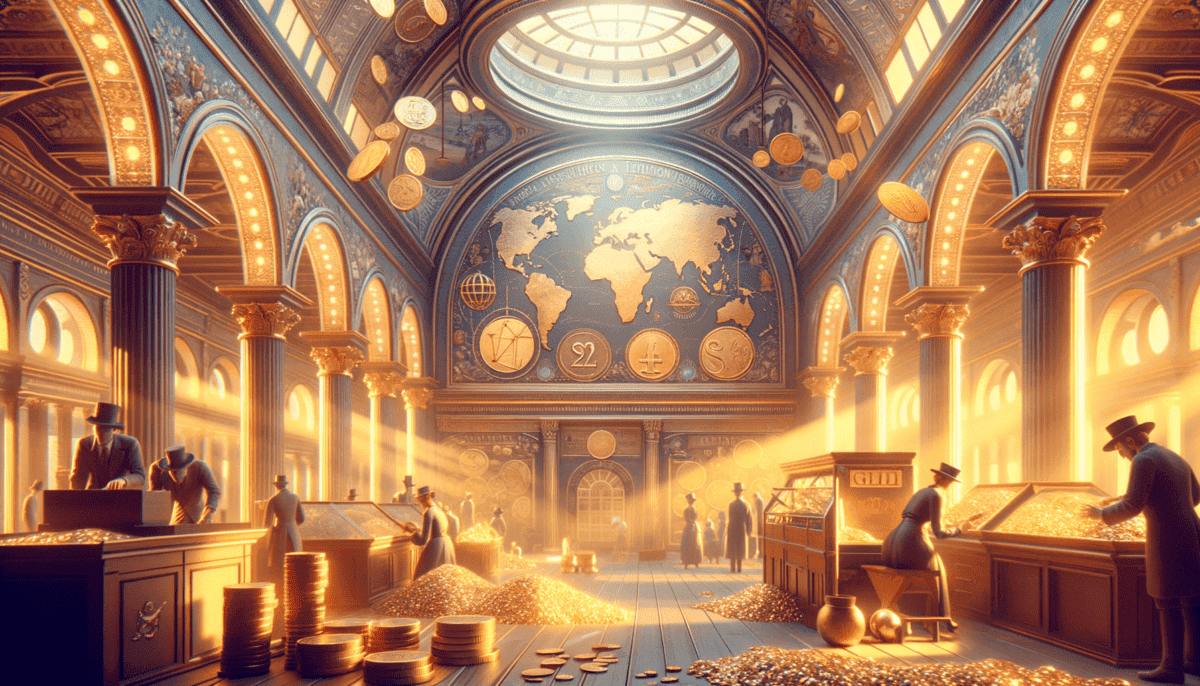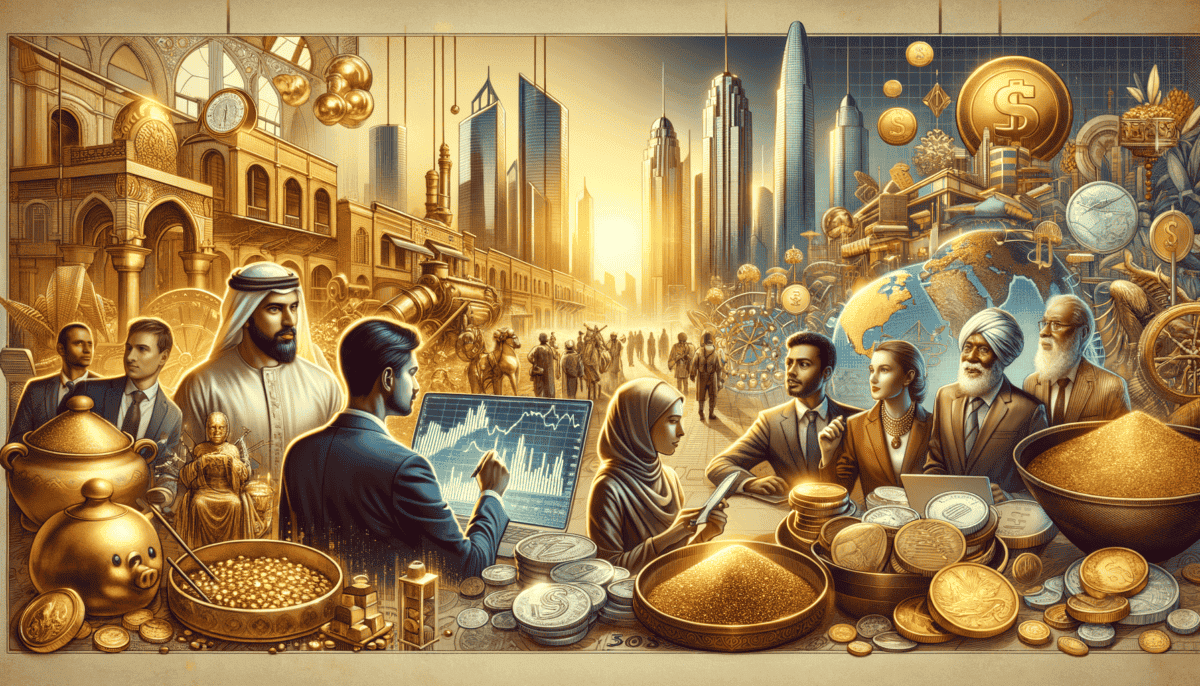The Glittering Origins
Long ago, in ancient lands far away, people discovered something special – gold! Little Tommy held up a shiny rock to the sun, his eyes wide with wonder.
"Grandpa, why is gold so special?" Tommy asked, turning the golden nugget in his small hands.
Grandpa smiled, settling into his favorite chair. "Well, Tommy, that's quite a story. People have loved gold since the very beginning of time."
In old Egypt, kings and queens wore beautiful gold crowns and jewelry. They believed gold was magical because it sparkled like the sun. The pharaohs, who were like kings, filled their giant pyramids with golden treasures!
The ancient people used gold in many special ways. In Greece, winners of games got gold medals (just like in the Olympics today!). In Rome, people used tiny gold coins to buy things at the market.
"But why did they pick gold, Grandpa?" Tommy asked, still fascinated by the gleaming rock.
"That's a great question! You see, gold was perfect for money because:
• It was rare – you couldn't find it everywhere
• It was pretty – everyone liked how it looked
• It was easy to carry – you could make small coins
• It lasted forever – it didn't break or wear out"
“Gold is like sunshine you can hold in your hand,” Grandpa explained with a twinkle in his eye.
People from different places all agreed that gold was valuable. Traders from China would travel on long, dangerous roads called the Silk Road, carrying gold to trade for special things like silk and spices.
The First Golden Cities
Cities grew rich when people found gold nearby. In Africa, a place called Mali had so much gold that its king, Mansa Musa, became the richest person ever! When he traveled to other places, he gave away so much gold that it changed how much things cost in those cities!
"Wow!" Tommy exclaimed. "That's a lot of gold!"
"It sure was," Grandpa chuckled. "And you know what? Gold was so special that some people spent their whole lives looking for it. They climbed mountains, crossed deserts, and sailed across oceans!"
Different places had different ways of finding gold. In rivers, people used special pans to wash away dirt and find tiny pieces of gold. In mountains, they dug deep tunnels to find gold hidden in rocks. ⛏️
"Finding gold wasn't easy," Grandpa continued. "But people kept looking because they knew how special it was. Gold helped people trade with each other and make their cities rich and powerful."
Tommy looked at his small piece of gold with new respect. "So gold helped people become friends and trade with each other?"
"That's right! Gold helped connect people from all over the world. It was like a special language that everyone understood – if you had gold, you could trade with anyone, anywhere!"
The ancient world sparkled with golden treasures, from the temples of South America to the palaces of Asia. Each piece of gold told a story of adventure, trade, and discovery.
The Golden Rush
“Gold! Gold in California!” shouted the newspaper boy on a chilly January morning in 1848. The whole world was about to change because of some tiny yellow flakes found in a river.
Sarah watched her daddy pack his bags. Like many others, he was heading west to find gold. “Will you find lots of gold, Daddy?” she asked.
“I sure hope so, sweetheart,” he smiled, ruffling her hair. “People say the rivers there are full of gold!”
These brave people were called “forty-niners” because they came in 1849. They weren’t just from America – they came from China, Mexico, and even Australia! Some sailed on big ships, others walked for months across the country. ♂️
Life as a Gold Hunter
Finding gold wasn’t easy! People worked very hard every day. They stood in cold rivers with special pans, swishing water around to find tiny bits of gold. Some dug deep holes in the ground. Others used big water hoses to wash away dirt from hills.
“The best part wasn’t just finding gold – it was the hope that tomorrow might be your lucky day!” – Old Joe, a forty-niner
Here’s what gold hunters needed:
• A strong pan for washing gold
• A shovel for digging
• Warm clothes
• Lots of food
• A strong back for working hard
New Towns Pop Up
Small towns grew into big cities almost overnight! San Francisco was just a tiny town with 200 people before the gold rush. Soon, it had over 36,000 people! ️
“Mama, where will all these people live?” asked little Tommy, watching wagons roll into town.
“They’ll build new houses, shops, and schools,” his mama explained. “That’s how towns grow!”
The Australian Gold Rush
The excitement spread across the ocean to Australia! In 1851, Edward Hargraves found gold there. He remembered how California looked and thought Australia’s mountains looked similar. He was right!
“G’day, mates!” called out Jack, an Australian gold hunter. “The gold here is as big as potatoes!”
The news spread fast. Soon, ships full of people from England, China, and America were sailing to Australia. They called it “The Lucky Country” because of all the gold they found.
Changes and Challenges
The gold rushes changed everything. Native Americans and Aboriginal Australians lost their lands. Rivers got dirty from mining. But new railroads were built, and people learned to live together – even though they came from different places and spoke different languages.
Some people got very rich, but most didn’t find much gold. Still, they started new lives in these growing places. They opened stores, built farms, and started families.
Sarah’s daddy finally came home from California. He didn’t find much gold, but he had amazing stories to tell. “The real treasure,” he said, hugging her tight, “was the adventure and the friends I made along the way.” ❤️
The gold rushes showed how one small discovery could make thousands of people pack up and move across the world. They dreamed of finding gold, but they found something else too – new homes, new friends, and new ways of life.
The Global Gold Movement
Tommy sat in his grandfather’s study, looking at an old gold coin. “Why did people start using paper money instead of gold coins?” he asked. His grandfather smiled, ready to share an exciting story.
A New Way to Use Gold
“You see, Tommy,” Grandfather began, “carrying lots of gold coins was heavy and dangerous. So clever people came up with a better idea – paper money that promised to give you gold if you wanted it!”
Little Mary, Tommy’s sister, looked confused. “But how did they know how much gold each paper was worth?”
“Think of it like a ticket to get your favorite toy from a toy store. The ticket isn’t the toy, but you can trade it for one!” Grandfather explained.
Countries Join Together
One by one, different countries started using this new system. England was first, and other countries thought it was a great idea!
Here’s what made the Gold Standard special:
• Every paper dollar could be traded for real gold
• Countries kept lots of gold in special banks
• People could trade with other countries more easily
• Money had the same value everywhere
Making Money Make Sense
“But what if someone wanted all their gold at once?” Tommy wondered.
“That’s a great question!” Grandfather replied. “Banks had to be very careful. They kept lots of gold safe in big vaults with thick walls and strong locks.”
Working Together
Just like kids learning to share toys at playtime, countries had to learn to work together. They made special rules about trading and helping each other.
“Did everyone follow the rules?” Mary asked.
“Not always,” Grandfather chuckled. “Sometimes countries needed more money than their gold would allow. It was like trying to buy more ice cream than you have money for!”
Changes in the World
Big banks opened in many cities. People from different countries could do business more easily. Ships carried goods across oceans, knowing the money would be worth the same everywhere.
Leaders from different countries met to make plans. They wore fancy suits and made important decisions about how to use gold to keep money stable. Sometimes they disagreed, but they usually found ways to work things out.
Growing Pains
The new system wasn’t perfect. Some countries had more gold than others, which made them more powerful. Small countries sometimes struggled to get enough gold.
“It’s like when we play games,” Tommy said. “It’s not fun when one person has all the best toys!”
“Exactly!” Grandfather nodded. “That’s why countries had to learn to be fair and help each other.”
As the sun set outside the study window, Tommy and Mary had learned something important. Money isn’t just about coins and paper – it’s about people working together and keeping promises.
Grandfather put the old gold coin back in its special box. “The Gold Standard changed how the whole world thought about money,” he said. “And that was just the beginning of the story…”
Hard Times and Big Changes
Tommy and Mary returned to Grandfather’s study the next day, eager to hear more. “What happened next with the gold money, Grandpa?” Tommy asked, eyes bright with curiosity.
When War Changed Everything
“Well,” Grandfather began, settling into his favorite chair, “something very big happened – World War One. Countries needed more money than their gold could cover.”
“What did they do?” Mary asked, hugging her teddy bear.
“They had to break their gold promises to pay for the war. It was like breaking open their piggy banks in an emergency!”
Trying to Fix Things
After the war, countries tried to make the Gold Standard work again. But it was harder than before!
The biggest problems they faced were:
• Not enough gold to go around
• Some countries had too much gold
• Other countries had almost none
• People were scared to trust paper money
The Great Depression Hits
“Then came the Great Depression,” Grandfather continued. “It was like a huge rainy day that wouldn’t end. Banks closed, and many people lost their jobs.”
Making Tough Choices
“That sounds scary,” Tommy said, scooting closer to his sister.
“It was,” Grandfather nodded. “Countries had to make big changes. England stopped using the Gold Standard first. It was like changing the rules of a game because the old rules weren’t working anymore.”
A New Way Forward
Countries started trying different ways to make money work. They printed more paper money and made new rules about banking.
“But what about all the gold?” Mary asked.
“Countries kept their gold safe in vaults, but they stopped promising to trade paper money for it. It was like keeping a special toy collection but not playing with it anymore!”
Working Together Again
Even with all these problems, countries didn’t give up. They worked together to find new solutions. Leaders met to make new plans about money.
Tommy looked thoughtful. “So they had to be creative and try new things?”
“Exactly!” Grandfather smiled. “Just like when you build with blocks – sometimes you have to knock everything down and start over to make something better.”
Learning from Mistakes
The hard times taught everyone important lessons. Countries learned they needed to help each other more. They also learned that money systems need to be flexible, like a rubber band that can stretch when needed.
“But what happened next?” Mary asked, not wanting the story to end.
Grandfather smiled mysteriously. “That’s when things got really interesting. A new president had some big ideas about how to fix everything…”
The children leaned forward, ready to hear more about how money changed forever. The old gold coin on Grandfather’s desk seemed to shine a little brighter, holding secrets about tomorrow’s story. ✨
Big Changes Come to Money
“President Roosevelt had a big plan,” Grandfather began, pulling an old newspaper from his desk. “He knew people were scared about their money.” ️
A Bold Move
“What did he do?” Tommy asked, peering at the yellowed newspaper.
“He told everyone they had to give their gold to the government,” Grandfather explained. “It was like trading in old toys for new ones.”
“People couldn’t keep gold coins anymore. They had to use paper money instead. The government kept all the gold safe in a special place called Fort Knox.”
Making New Rules
Mary looked confused. “But why did they have to give up their gold?”
“The president wanted to make sure everyone used the same kind of money. It helped make things more fair,” Grandfather said, showing them a picture of Fort Knox.
The Bretton Woods Meeting
“Then something really big happened,” Grandfather continued. “Leaders from many countries had a special meeting at a place called Bretton Woods.”
The new plan worked like this:
• Every country’s money was tied to the U.S. dollar
• The U.S. dollar was tied to gold
• Countries could trade dollars for gold if they needed to
A New Way of Working
“This new system helped countries work together better,” Grandfather explained. “It was like having one big playground where everyone agreed on the rules.”
Tommy picked up the old coin from the desk. “But what happened to all the gold coins people used to have?”
“They became special collector’s items,” Grandfather smiled. “Like baseball cards or rare stamps.”
Times Keep Changing
The new system worked well for many years. But the world kept changing. More countries needed more dollars.
Problems Start Again
“But then something started to go wrong,” Grandfather continued, his voice getting serious. “Countries started asking for their gold back instead of keeping dollars.”
“Why did they want their gold back?” Mary asked.
“They were worried about having too many dollars,” Grandfather explained. “It’s like having too many cookies – sometimes you want something different!”
A Big Decision
In 1971, another president made another big change. President Nixon said America wouldn’t give gold for dollars anymore.
“That sounds scary,” Tommy said. “Did it work?”
“It was a big change,” Grandfather nodded. “But sometimes big changes are good. The world learned to use money in new ways.”
Looking Forward
Mary looked at the old gold coin again. “Do you think we’ll ever use gold for money again?”
Grandfather smiled mysteriously. “Well, that’s an interesting question. Gold is still very important today, but in different ways…”
The children sat up straighter, knowing there was more to learn about gold’s story in the modern world. The afternoon sun made the old coin gleam, like it was ready to share more secrets. ✨
Gold’s New Adventure
“Gold still tells an amazing story,” Grandfather said, holding up the shiny coin one last time. “Even though we don’t use it as money anymore.” ✨
A Special Metal
Tommy looked puzzled. “If we don’t use gold for money, what do we use it for?”
“So many things!” Grandfather smiled. “It’s in computers, phones, and special medical tools. It’s like gold found new jobs!”
• Making smartphones work better
• Helping astronauts in space
• Making beautiful jewelry
• Keeping computers safe
• Helping doctors help sick people
Gold’s Special Power
“But what about money?” Mary asked. “Does gold still help with money?”
“Yes, in a special way,” Grandfather explained. “Many people and countries still keep gold safe, just in case they need it.”
“It’s like having a super-safe piggy bank that never breaks!”
Around the World
Grandfather pulled out a colorful world map. “See these countries? They all have special rooms full of gold.” ️
“Even today?” Tommy asked, eyes wide.
“Even today! Countries like keeping gold safe. It makes them feel strong and ready for anything.”
Learning from the Past
Mary traced her finger along the old coin’s edge. “What did we learn from using gold as money?”
Looking to Tomorrow
“Now we have new kinds of money,” Grandfather said. “Some people even use digital money on computers!”
“Like Bitcoin?” Tommy asked excitedly.
Grandfather chuckled. “Yes, like that! Money keeps changing, just like it did with gold. But gold’s story helps us understand how to make good choices about money.”
A Lasting Treasure
“Will gold always be special?” Mary wondered.
“I think so,” Grandfather smiled warmly. “Gold reminds us that valuable things last forever. It teaches us to be careful with money and work together.”
The Story Continues
As the sun set, casting golden rays through the window, Grandfather carefully placed the old coin back in its special box.
“Remember,” he said softly, “gold’s story isn’t over. It’s just different now. And who knows? Maybe someday you’ll add your own chapter to its amazing story!”
Tommy and Mary smiled, knowing they’d learned something precious – not just about gold, but about how people can work together to make good things happen. The old coin might not buy anything anymore, but its lessons were worth more than all the gold in Fort Knox. ⭐
As they walked home in the golden sunset, the children knew they’d never look at money the same way again. Gold’s story had taught them that the best treasures are the ones we share – like knowledge, cooperation, and hope for tomorrow.






